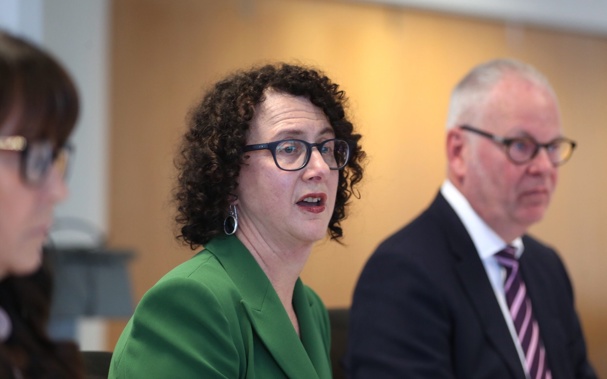
The head of Stats NZ has resigned after a review heavily criticising the department's handling of the troubled 2018 Census.
The Government's statistics department has faced scrutiny since last year's Census – the first to prioritise online data collection - produced one of the worst participation rates in decades, with one in seven people failing to complete it.
It left Stats NZ delaying the results and plugging holes in its data with figures from other Government sources.
On Tuesday, the department's chief executive, and Government Statistician, Liz MacPherson quit, saying she took full responsibility for issues identified in a just-released independent report into the problems.
"We were too optimistic, placed too much emphasis on the online Census, and did not have robust contingency plans in place for when things started to go wrong," she said.
"Put simply, we didn't make it easy enough for everyone to take part and that will be a key focus for the next Census … We let ourselves and New Zealand down."
She will stay on until Christmas to oversee the clean-up effort and the Government will begin recruiting for a replacement in coming weeks.
MacPherson told reporters that by using data such as tax records, birth records and drivers' licences the Census would still be usable for DHB funding, electoral counts and national population counts.
"But the fact of the matter is we should not have been in this situation … we shouldn't have had to do all this remedial work."
Some statistics on more personal data, such as iwi affiliation - and a number of other data sets still to be figured out - would not be viable.
"It's not a silver bullet," MacPherson said.
State Services Commissioner Peter Hughes said MacPherson had done the right thing.
"She has taken full responsibility for what went wrong and she is doing an excellent job fixing it. That is what I expect of public service chief executives," he said.
"I want to see her complete that task."
Tuesday's report - carried out by professional director Murray Jack and former Canadian Census assistant chief statistician Connie Graziadei - found management was slow to react as it became clear the results were not coming in as expected.
"It is in our view that the focus on online responses and overly optimistic view of 'Stay the course. The paper will come', led to insufficient action being taken at the appropriate time," they said.
The report also concluded:
- There was too much focus on the online work and not enough testing
- The design of the survey was feasible but the problem was how it was carried out
- The budget was big enough – but more funding was needed to cover risks for the change of approach
- Leadership lacked strategic direction and there was too much optimism.
- The field workforce was too small – only about 40 per cent of the size of that in 2013.
- There was not enough preparation for offline results – for example only 4800 bilingual packs were printed, making it difficult for Maori to engage.
- The costs and impact of the North Canterbury earthquake – which closed Statistics NZ's offices in November, 2016 – were underestimated.
MacPherson admitted on Tuesday that, in hindsight, carrying out the Census after the quake may have been a mistake.
The report has made 16 recommendations, including that the next Census still be held in 2023, saying 2021 would not leave enough time for a safe redesign.
It's also called for the creation of an independent body to advise the department on ethics, privacy, security relating to the use of alternative data sources, the establishment of a Design Authority to help set up future surveys, and a Census Board to be installed in the department.
It was earlier revealed about 11 per cent of the records for 4.7 million people have had to come from other government departments and information and some information.
Most of the data, collected last March, will be released late next month, with the rest to come out by mid-2020.
But because of the poor result, it won't be producing some usual information, such as statistical counts of iwi.
"Unlike many other administrative data, government departments don't collect iwi affiliation data or they don't collect it very well," MacPherson said.
The response rate among Maori was 68 per cent and about 65 per cent for Pacific people, down from 88.5 per cent and 88.3 per cent in the previous Census, in 2013.
Tuesdays' report also found the response rate among those aged 15 to 29 was only 75 per cent.
Statistics Minister James Shaw defended the results on Tuesday, saying population coverage data, the most significant statistic, had better return than in 2013.
"While the review has found failings, these are being fixed," he said.
"The focus now needs to be on ensuring a successful census in 2023.That needs to include working with key stakeholders, like iwi Māori and the LGBTQ+ communities."
The Opposition has previously called the effort a "shambles" and says it leaves a huge hole in information required for Government decision-making.
"I'm losing faith in Stats New Zealand. I think it's a situation where we've got a Census now we have a huge amount of doubt in," National leader Simon Bridges said this year.
However, the Government has pointed the finger back, arguing it was the previous National Government, in 2014, that decided to move the Census online and that not enough funding had been allocated for the change.
The five-year budget for the 2018 Census was $120 million, compared to about $90m for the 2013 one.
By law, the Census has to be conducted every five years and is meant to produce a complete picture of who is living in the country. It is used to make decisions about policy and the way resources are distributed, as well as electoral boundaries
Take your Radio, Podcasts and Music with you









